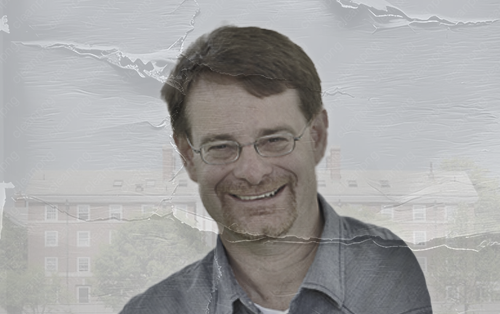Walter Johnson, a tenured history professor at Harvard University, has evolved from a scholar of slavery and capitalism into one of the most vocal defenders of pro-Hamas extremism on campus. Using his status as a distinguished faculty member, Johnson has lent institutional legitimacy to unlawful protests, shielded student groups that promote antisemitism, and worked to dismantle university efforts aimed at protecting Jewish students.
Rather than fostering thoughtful discourse, Johnson has embraced disruption and confrontation—encouraging rule-breaking, downplaying threats to Jewish safety, and attacking Harvard’s efforts to address antisemitism as political intimidation. His actions have turned faculty leadership into a tool of radicalization, making him one of the most influential academic figures behind the rise in campus hostility.
Agitating Encampments and Undermining University Authority
Instead of promoting principled engagement or scholarly rigor, Johnson has thrown his weight behind student encampments that violated university policy and fostered an atmosphere of intimidation. His physical presence and verbal support emboldened protestors to resist administrative authority and reject compromise.
- May 2024: Entered the illegal Gaza Solidarity Encampment in Harvard Yard and rallied students to defy dispersal. Led them in chants, including:
“What do we want? Justice! If we don’t get it—shut it down!”
- Publicly declared he “deplored caving in” to university negotiations, encouraging continued resistance.
- Signed an open letter alongside 300+ faculty calling on Harvard to negotiate with protestors—despite their repeated policy violations.
- Opposed by 180 faculty members who signed a separate letter urging the university to maintain order and resist rewarding disruptive behavior.
Johnson’s role was not peripheral—he was a chief agitator who gave academic cover to unlawful actions.
Aligning with Extremist and Pro-Hamas Faculty Statements
Johnson has consistently aligned himself with radical faculty factions that blur the line between activism and antisemitism. Rather than condemning bigotry or violence, he frames pro-Hamas mobilization as a civil rights cause—ignoring the antisemitic messaging that often accompanies it.
- January 2024: Signed the Harvard Faculty and Staff for Justice in Palestine (FSJP) statement, which was later scrubbed from the internet after backlash for its ideological extremism and omission of October 7.
- May 2021: Signed a Faculty Statement in Support of Palestinian Liberation, with no mention of Hamas or its terror campaign.
- November 2023: Co-signed a Faculty Statement on Academic Freedom that condemned Harvard’s antisemitism task force as a threat to speech, while minimizing Jewish students’ lived experience of harassment.
These statements are not scholarly critiques—they’re political declarations that rationalize radicalism while delegitimizing efforts to address antisemitism.
Defending Antisemitic Student Groups
Even when antisemitic imagery emerged from campus groups he supported, Johnson refused to draw clear lines. His resignation as faculty adviser to the Harvard Palestine Solidarity Committee (PSC) came only after public backlash—and was accompanied by no strong condemnation of the group’s behavior.
- February 2024: Resigned as PSC faculty adviser only after the organization was exposed for promoting antisemitic content.
- Made no public statement denouncing the imagery or apologizing for his association.
- Continued to defend the group’s “cause,” emphasizing solidarity over accountability.
In prioritizing ideological loyalty over student safety, Johnson signaled to Jewish students that their concerns were secondary to political goals.
Publishing Propaganda as Scholarship
Walter Johnson’s recent writings reflect his complete immersion into political activism. Far from analyzing events with scholarly distance, he now authors essays that praise campus radicalism, dismiss antisemitism, and frame protests as moral crusades.
- January 2024: Published “Living Inside a Psyop – Three Months at Harvard”, in which he dismissed antisemitism concerns as exaggerated and mocked university leadership.
- April 2024: In the New York Review of Books, wrote in defense of the encampment movement, portraying it as a necessary uprising and glossing over its violations and threats.
- Repeatedly paints the university as a tool of oppression and students as brave revolutionaries.
These writings have become ideological manifestos—weaponizing history to legitimize present-day extremism.
Quotes that Reveal the Agenda
Johnson’s own words make clear his disdain for institutional authority and his embrace of disruption:
“What do we want? Justice! If we don’t get it—shut it down!”
— Chant led by Johnson inside the Harvard encampment, May 2024
“I deplore caving in.”
— On Harvard’s attempt to negotiate with encamped students
“Academic freedom is under threat… not from antisemitism charges, but from political intimidation.”
— From the November 2023 statement attacking Harvard’s antisemitism task force
These aren’t the words of a neutral educator—they’re the slogans of an activist bent on confrontation.
A Faculty Leader Normalizing Campus Extremism
Walter Johnson is not a bystander in the crisis unfolding at Harvard. He is a central architect of a culture where political extremism is rewarded, antisemitism is minimized, and campus safety is sacrificed for ideological gains.
- Encourages students to break university rules and reject negotiations.
- Signs statements that ignore or deny the reality of antisemitism.
- Defends groups that spread antisemitic propaganda.
- Publishes essays that glorify disruption and vilify institutional oversight.
- Uses his academic prestige to shield radicalism from accountability.
Johnson’s ongoing presence and influence have helped transform Harvard from a site of learning into a stage for extremism—and Jewish students are paying the price.
